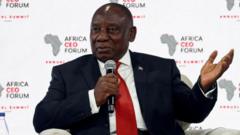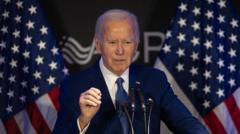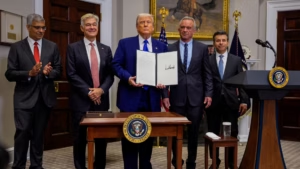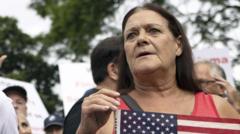US President Donald Trump has called attention to the plight of white South Africans, suggesting a genocide is unfolding against them, reflected in his decision to grant refugee status to Afrikaners. This article delves into the historical context, contemporary political landscape, and the reactions of those involved, revealing no mainstream consensus on the notion of a genocide in South Africa.
Claims of Genocide Against White South Africans: A Closer Look at Trump's Controversy

Claims of Genocide Against White South Africans: A Closer Look at Trump's Controversy
Amidst Donald Trump's claims of a genocide against Afrikaners, a deeper exploration reveals the complexities of race, history, and current sentiments regarding migration to the United States.
Amid increasing tensions regarding race relations in South Africa, US President Donald Trump recently asserted that a genocide against the Afrikaner community is occurring, leading to the granting of refugee status to some members of this group. Approximately 60 Afrikaners arrived in the United States after receiving asylum. The South African government cooperated with U.S. authorities to facilitate their applications and travel, a scenario that many argue does not typify the usual conditions faced by refugees escaping violence.
The Afrikaner identity, predominantly descending from European settlers of the 17th century, integrates influences from Dutch, German, and French heritage. The cultural group has a complex history characterized by both settlement and conflict with native black populations, particularly evident during the apartheid regime established in 1948, which enforced severe racial segregation.
Despite claims of genocide echoed by far-right groups and Trump himself, there has been no formal acknowledgment of such a situation from any major South African political entity. Assertions of violent attacks against white farmers—often cited by right-wing advocates—have been rebuffed by legal authorities, who label these claims as unfounded. A notable ruling indicated that allegations of genocide were "clearly imagined" and did not hold up under scrutiny.
In his remarks, Trump cited the brutal killings of white farmers and land confiscation as justification for his actions, expressing doubts about attending the upcoming G20 summit in South Africa given these alleged circumstances. South African President Cyril Ramaphosa, however, rebuked these claims as "completely false," asserting that the changes in land ownership are intended to remedy historic injustices regarding land dispossession faced by black citizens during apartheid.
Elon Musk, a prominent figure with ties to both the U.S. and South Africa, has entered the discourse, attributing his business struggles in South Africa to what he describes as "racist ownership laws." His commentary, alongside accusations against political party leaders for inciting violence through inflammatory rhetoric, adds another layer of complexity to an already convoluted narrative.
Interestingly, despite Trump's refugee offer resonating with a faction of the Afrikaner population, broader interest in relocating appears limited. Reports suggest that only a small percentage—approximately 70,000 out of 2.5 million Afrikaners—have shown a willingness to leave. The U.S. embassy's recent clarifications indicate that their resettlement criteria encompass individuals from any racial minority.
Local Afrikaner organizations, such as Solidarity, have actively contested the notion of mass emigration, emphasizing their commitment to building a future within South Africa. The ongoing discussion highlights the intricacies of identity and belonging among Afrikaners and raises vital questions about the legacy of apartheid and the ongoing socio-economic challenges the nation faces today.






















